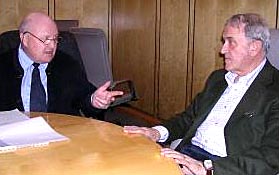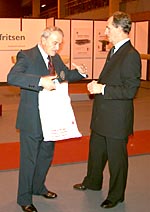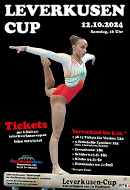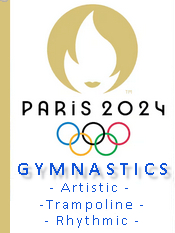Deutsch Englisch
16. Februar 2004
Zurich / Switzerland
Artistic Gymnastics
Interview with FIG-President Bruno Grandi
 |
|
Bruno Grandi |
During the recent meetings of the leading committees of the International Gymnastics Federation FIG in Zurich the head of press of the Swiss Gymnastics Federation, Erwin Hänggi interviewed the Italian president of the FIG, Bruno Grandi. The FIG-president presented some information on the current problems and the general future of the FIG as well as gave his personal view on the numerous development problems in gymnastics…

STV- head of press Erwin Hänggi in a conversation with Bruno Grandi
Foto: zvg
 |
|
Bruno Grandi - always close to the practical side of things, here talking to gymnastics equipment producer Jac Janssen |
The Italian FIG-President Bruno Grandi, the 'World gymnast no. 1', is one of those sports officials who does this work as a full-time job. Although he is already 70 years old he still wants to realise new ideas when he thinks they are correct and always wants to develop further every aspect in the World of gymnastics.
Being a former gymnast and coach, but also a teacher , later professor and official on all stages he also has a philosophic touch and knows all the problems in modern gymnastics. The President of the FIG, one of the most powerful federations in the Olympic family, is sitting at all control levers to make political decisions or to influence them.
However, he still also is a practitioner as can be seen in the following interview. His body as well as his mind
Being a former gymnast and coach, but also a teacher , later professor and official on all stages he also has a philosophic touch and knows all the problems in modern gymnastics. The President of the FIG, one of the most powerful federations in the Olympic family, is sitting at all control levers to make political decisions or to influence them.
However, he still also is a practitioner as can be seen in the following interview. His body as well as his mind
have remained young, he looks over the end of his own nose and analyses the tendencies in the technical area to give the impulses for the according changes.
Such kind of characteristics make an official who is a realist but at the same time also is being visionary. The FIG can be happy to have a president on top who comes to the fore with fairness and the equality of opportunties for all athletes and who sees himself as being a servant of the sports of gymnastics.
Such kind of characteristics make an official who is a realist but at the same time also is being visionary. The FIG can be happy to have a president on top who comes to the fore with fairness and the equality of opportunties for all athletes and who sees himself as being a servant of the sports of gymnastics.
The interview with FIG-President Bruno Grandi
.. has been carried out by Erwin Hänggi, head of press of the STV
Hänggi:-- What can be moved by the FIG, officially named Fédération Internationale de Gymnastique, in its’ 122 member federations, which are the most important impulses which have to be spread?
Bruno Grandi: It is our aim to bring a sportive philosophy to those countries which are lying behind at the moment and to spread a culture of gymnastics all over the World. We want to think about the less powerful ones and to try to create equal opportunities for all. The realisation of this, e.g. in developing countries, is difficult. It doesn’t help to send one coach there who works for a short period of time, formats a group which then is successful but when the coach leaves nothing continues any further. Continuity is needed and this is only possible when the culture is being transmitted, when you create a mosaic step by step. We are thinking about creating so called age- groups, especially in women’s artistic gymnastics. And after all we are also active in the fight against corruption and doping.
More weight for the art instead of for the acrobatics
Topic men’s artistic gymnastics. You have been a gymnast and coach yourself so you are not only an offical but also know the practical side of things. Will the way of gymnastics lead to even more acrobatics or will the art, the clean execution, gain more weight?
Bruno Grandi: At first I would like to say that the Technical Committees are operating the development. We can only give impulses. However, the tendency clearly goes towards a clean technical execution. The good control of the body, the harmony, the combination of elements should gain more weight. The art, which also gave the sport part of its’ name, should be valued higher in the judging. I remember the World championships in Anaheim: Two routines on high-bar, one full of the highest difficulties, but partly executed badly; the other one, also with a SV of 10.00 but not as spectacular, received the higher score. This has not been very well liked by the audience which wants to see spectacular elements. Nonetheless the decision has been correct. In other words: Sometimes less is more. This has to be our orientation.
In women’s artistic gymnastics a minimum age of 16 is requested for the participation in Olympic Games, many still want to raise this limit. That, however, is contradictory to the tendency that young girls learn the highest difficulties quicker and can present top routines already at the age of 12 or 13. What is the opinion of the FIG regarding this problem?
Bruno Grandi: I personally think that it is a pity we only see a few older, mature female gymnasts in international competitions which are broadcasted World-wide on TV. The average age at the World championships in Anaheim has been 16.5 years, only 7 gymnasts have been 20 years old or older. At the European Championships in Patras the average age in the senior’s competition was even lower. Already three years ago we have suggested to the federations of all continents to organise competitions with various age groups, that means competitions for the age-groups 11,12,13 etc. In these events the compulsory elements should be required according to the age. We also promised financial support. However, nothing has happened, no suggestions were made. It is a pity that in today’s system already 14-year old girls give up artistic gymnastics, no matter for which reasons. We have to work against this.
Fight against Corruption and Doping
Apart from large international events it can be read about rhythmic gymnastics in the press only when another scandal has happened: Corruption of the judges, doping. It is evident that the FIG is serious in their fight against doping, since during the last 2 years four of the five World-best gymnasts were suspended after a positive doping sample. However, this is bad for the image of the sports. What does the future look like?
Bruno Grandi: We will continue to fight hard against doping. The same has happened regarding the issue with the judges. After the World Championships 2000 in Saragossa 32 judges were suspended. They were not allowed to take part in the Olympic Games in Sydney three months later. We have created a special kind of Brevet. Only judges who have this are allowed to judge at World Championships and we also have already suspended judges for four years. We will continue to go even further. If a judge is suspended her country will not have the claim on a judge’s spot at the next World Championships. This is a hard measurement. We, however, also want to go the other way and honour the judges which are judging in an especially good, correct way. This will be done officialy, in front of the audience, in order to show who works truly for the sports and does not see only one country. This is supposed to be an incentive to do without any kind of dealings.
During recent years the FIG has integrated new kinds of sport:Trampolining, sports aerobics, sports acrobatics. Are you happy with the goals which have been reached up to now?
Bruno Grandi: Trampolining went through the expected upswing because of the Olympic acknowledgement. With about 1,500 participants – including minitramp and tumbling - we have seen a true explosion at the World championships 2003 in Hanover. This is a bit different in aerobics and acrobatics, in contrast to trampolining in these kind of sports the long tradition of competitions is missing. In former times the show has been to the fore. The intergration of these 2 kinds of sport is progressing slowly. All coaches and gymnasts at first have to get used to the habits of a large sports federation.
Gymnaestrada: A celebration for eveyone - from 3 up to 80 years
The Gymnaestrada 2003 in Lissbon has been a great sportive success. However, one had the feeling that the FIG should have had more influence on the organisers, the “controlling” had been missing. How does the future look like for general gymnastics?
Bruno Grandi: It is our aim to develop general gymnastics further. We e.g. have the idea to organise Gymnaestradas in all odd years, for example 2005 for one continent and then 2007 World-wide. Regading Lissbon it has become clear to us that you can’t just leave the organisation of the starting and closing galas to the organisers. This will be changed. I think you should also try to integrate more children in the age between 5 and 8. The Gymnaestrada is supposed to be a celebration for everyone between 3 and 80 years. I personally think there should be less show with expensive costumes and a super- choreography included. Of course spectacular elements and contemporary music shouldn’t be missing. But they should only be the means to an end. It is gymnastics which should be to the fore.
Will new competition formats being introduced during the next years? On your initiative it has been reached already that the finals in artistics gymnastics now take place in a time frame which is acceptable. Which other new aspects do you want to realise?
Bruno Grandi: At the moment we want to stabilize the current competitions, we don’t want to create any new ones. What we would like to reach are standardized rules for the competitions of all gymnastics disciplines. Currently the systems are far too complex for a non-expert since they are always different. For example in artistic gymnastics the Code of the men and women should go through a certain kind of standardization. There are large common things: High bar is similar to uneven bars, vault is the same etc. Furthermore, the judging regulations should be valid for eight years in future and not anymore only for four years like now.
Another period of duty...?
The projects of the FIG, the solidarity with weaker countries, the training for coaches and judges, the whole administrative and technical organisation of the federation cost a lot of money. Is the financing of them secured?
Bruno Grandi: We have good contracts. Thanks to the large amount of TV-spectators gymnastics has at Olympic Games we strongly participate in the income which comes out of the TV-contracts for Olympic Games. This secures us continuity and stability. To manage all tasks we work with an anual budget of 5 to 6 million Swiss franks. Regarding TV – except for the Olympic Games - we depend on the work and successes of individual nations. One example: After the World championship victory of Brazil’s Dos Santos we have managed to close a TV- contract with a Brazilian TV- station.
Last question: Will Bruna Grandi run for a third four-year period of duty at the FIG- congress in Antalya/ Turkey in October 2004?
Bruno Grandi:I know that there are several candidates and have not made a final decsision yet. We still have a lot to do and not all ideas which I have started to bring on the way are realised up to now. It has always been my aim that we make progress and are open for new ideas but also keep our tradition, the culture of gymnastics. All athletes should have the same opportunities. Through this we enjoy the confidence of our members.
The interview has been carried out by STV- head of press Erwin Hänggi; translated by Lisa Worthmann/GYMmedia
GYMmedia- publication with the friendly permission of the STV.
.. has been carried out by Erwin Hänggi, head of press of the STV
Hänggi:-- What can be moved by the FIG, officially named Fédération Internationale de Gymnastique, in its’ 122 member federations, which are the most important impulses which have to be spread?
Bruno Grandi: It is our aim to bring a sportive philosophy to those countries which are lying behind at the moment and to spread a culture of gymnastics all over the World. We want to think about the less powerful ones and to try to create equal opportunities for all. The realisation of this, e.g. in developing countries, is difficult. It doesn’t help to send one coach there who works for a short period of time, formats a group which then is successful but when the coach leaves nothing continues any further. Continuity is needed and this is only possible when the culture is being transmitted, when you create a mosaic step by step. We are thinking about creating so called age- groups, especially in women’s artistic gymnastics. And after all we are also active in the fight against corruption and doping.
More weight for the art instead of for the acrobatics
Topic men’s artistic gymnastics. You have been a gymnast and coach yourself so you are not only an offical but also know the practical side of things. Will the way of gymnastics lead to even more acrobatics or will the art, the clean execution, gain more weight?
Bruno Grandi: At first I would like to say that the Technical Committees are operating the development. We can only give impulses. However, the tendency clearly goes towards a clean technical execution. The good control of the body, the harmony, the combination of elements should gain more weight. The art, which also gave the sport part of its’ name, should be valued higher in the judging. I remember the World championships in Anaheim: Two routines on high-bar, one full of the highest difficulties, but partly executed badly; the other one, also with a SV of 10.00 but not as spectacular, received the higher score. This has not been very well liked by the audience which wants to see spectacular elements. Nonetheless the decision has been correct. In other words: Sometimes less is more. This has to be our orientation.
In women’s artistic gymnastics a minimum age of 16 is requested for the participation in Olympic Games, many still want to raise this limit. That, however, is contradictory to the tendency that young girls learn the highest difficulties quicker and can present top routines already at the age of 12 or 13. What is the opinion of the FIG regarding this problem?
Bruno Grandi: I personally think that it is a pity we only see a few older, mature female gymnasts in international competitions which are broadcasted World-wide on TV. The average age at the World championships in Anaheim has been 16.5 years, only 7 gymnasts have been 20 years old or older. At the European Championships in Patras the average age in the senior’s competition was even lower. Already three years ago we have suggested to the federations of all continents to organise competitions with various age groups, that means competitions for the age-groups 11,12,13 etc. In these events the compulsory elements should be required according to the age. We also promised financial support. However, nothing has happened, no suggestions were made. It is a pity that in today’s system already 14-year old girls give up artistic gymnastics, no matter for which reasons. We have to work against this.
Fight against Corruption and Doping
Apart from large international events it can be read about rhythmic gymnastics in the press only when another scandal has happened: Corruption of the judges, doping. It is evident that the FIG is serious in their fight against doping, since during the last 2 years four of the five World-best gymnasts were suspended after a positive doping sample. However, this is bad for the image of the sports. What does the future look like?
Bruno Grandi: We will continue to fight hard against doping. The same has happened regarding the issue with the judges. After the World Championships 2000 in Saragossa 32 judges were suspended. They were not allowed to take part in the Olympic Games in Sydney three months later. We have created a special kind of Brevet. Only judges who have this are allowed to judge at World Championships and we also have already suspended judges for four years. We will continue to go even further. If a judge is suspended her country will not have the claim on a judge’s spot at the next World Championships. This is a hard measurement. We, however, also want to go the other way and honour the judges which are judging in an especially good, correct way. This will be done officialy, in front of the audience, in order to show who works truly for the sports and does not see only one country. This is supposed to be an incentive to do without any kind of dealings.
During recent years the FIG has integrated new kinds of sport:Trampolining, sports aerobics, sports acrobatics. Are you happy with the goals which have been reached up to now?
Bruno Grandi: Trampolining went through the expected upswing because of the Olympic acknowledgement. With about 1,500 participants – including minitramp and tumbling - we have seen a true explosion at the World championships 2003 in Hanover. This is a bit different in aerobics and acrobatics, in contrast to trampolining in these kind of sports the long tradition of competitions is missing. In former times the show has been to the fore. The intergration of these 2 kinds of sport is progressing slowly. All coaches and gymnasts at first have to get used to the habits of a large sports federation.
Gymnaestrada: A celebration for eveyone - from 3 up to 80 years
The Gymnaestrada 2003 in Lissbon has been a great sportive success. However, one had the feeling that the FIG should have had more influence on the organisers, the “controlling” had been missing. How does the future look like for general gymnastics?
Bruno Grandi: It is our aim to develop general gymnastics further. We e.g. have the idea to organise Gymnaestradas in all odd years, for example 2005 for one continent and then 2007 World-wide. Regading Lissbon it has become clear to us that you can’t just leave the organisation of the starting and closing galas to the organisers. This will be changed. I think you should also try to integrate more children in the age between 5 and 8. The Gymnaestrada is supposed to be a celebration for everyone between 3 and 80 years. I personally think there should be less show with expensive costumes and a super- choreography included. Of course spectacular elements and contemporary music shouldn’t be missing. But they should only be the means to an end. It is gymnastics which should be to the fore.
Will new competition formats being introduced during the next years? On your initiative it has been reached already that the finals in artistics gymnastics now take place in a time frame which is acceptable. Which other new aspects do you want to realise?
Bruno Grandi: At the moment we want to stabilize the current competitions, we don’t want to create any new ones. What we would like to reach are standardized rules for the competitions of all gymnastics disciplines. Currently the systems are far too complex for a non-expert since they are always different. For example in artistic gymnastics the Code of the men and women should go through a certain kind of standardization. There are large common things: High bar is similar to uneven bars, vault is the same etc. Furthermore, the judging regulations should be valid for eight years in future and not anymore only for four years like now.
Another period of duty...?
The projects of the FIG, the solidarity with weaker countries, the training for coaches and judges, the whole administrative and technical organisation of the federation cost a lot of money. Is the financing of them secured?
Bruno Grandi: We have good contracts. Thanks to the large amount of TV-spectators gymnastics has at Olympic Games we strongly participate in the income which comes out of the TV-contracts for Olympic Games. This secures us continuity and stability. To manage all tasks we work with an anual budget of 5 to 6 million Swiss franks. Regarding TV – except for the Olympic Games - we depend on the work and successes of individual nations. One example: After the World championship victory of Brazil’s Dos Santos we have managed to close a TV- contract with a Brazilian TV- station.
Last question: Will Bruna Grandi run for a third four-year period of duty at the FIG- congress in Antalya/ Turkey in October 2004?
Bruno Grandi:I know that there are several candidates and have not made a final decsision yet. We still have a lot to do and not all ideas which I have started to bring on the way are realised up to now. It has always been my aim that we make progress and are open for new ideas but also keep our tradition, the culture of gymnastics. All athletes should have the same opportunities. Through this we enjoy the confidence of our members.
The interview has been carried out by STV- head of press Erwin Hänggi; translated by Lisa Worthmann/GYMmedia
GYMmedia- publication with the friendly permission of the STV.




























